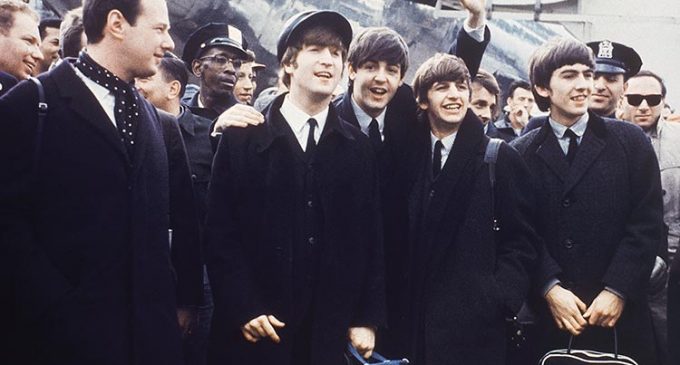Remembering Brian Epstein: The Late, Great Manager of the Beatles | Out Magazine

A gay Jewish man living in 1960s England, Brian Epstein was a double outsider, all the more out of place with his natty attire and crisp diction as he ran his record store and sought affection in dangerous, degrading ways. But in November 1961, he gazed, mesmerized, upon four pumped-up boys in leather jackets and jeans driving crowds wild at Liverpool’s Cavern Club. He was particularly captivated by one: John Winston Lennon. Epstein soon became the band’s manager, in possibly the most auspicious match in rock history.
The predominant narrative of Beatles history gives insufficient credit to the role Epstein played in shaping the group’s image and preparing them for international adulation. He dressed them in tailored suits (better for attracting the girls); shopped their records to label after label, armed with little but his name and his unyielding faith; fostered their songwriting; and encouraged the musicians’ penchant for goofy wordplay in press interviews while urging sophistication. In the words of Beatles producer George Martin, he “gave them style, taste, and charm.” As Vivek Tiwary put it in The Fifth Beatle, his celebrated illustrated novel about Epstein, the manager “played the business as his instrument.” And he excelled in the role: “Brian was a passionate man who would not take ‘no’ for an answer on behalf of his lads, and that is how we got to hear the Beatles’ music,” said Andrew Loog Oldham, the Rolling Stones’ former manager, in a 2000 interview with rock journalist Harvey Kubernik.
This narrative also gives insufficient credit to Epstein’s great motivation: a love for John Lennon that, while unrequited physically, brought out the best in him and in turn in the group. Lennon, well aware of Epstein’s infatuation with him, could be viciously cruel to him—which actually appealed to Epstein’s rough-trade inclinations—yet he spoke reverently of him to others, calling him at one point “our light at the end of the tunnel.”
The extent of Epstein’s actual involvement with Lennon is the subject of considerable debate. Some sources imply a furtive blow job on a Spanish vacation, but most suggest that no such encounter ever took place. Lennon himself, in a 1980 Playboy interview, deemed their relationship “almost a love affair, but not quite. It was never consummated.” His widow, the singer and artist Yoko Ono, concurred, telling the Daily Beast in 2015 that although Brian “made a move” on him, Lennon was “too inhibited” to indulge and might have only done so with someone he found more attractive.
Ultimately it doesn’t matter whether Epstein was intimate with John. What matters is that, guided by the certainty that only love can bestow upon a person, he helped convince the world that the Beatles were the most special group that rock had ever known, even while he labored under the specter of a law that could ruin him at any moment.
“In many ways, the whole world is living out this visionary dream that Epstein had,” says Rolling Stone columnist Rob Sheffield, who recently released his acclaimed book Dreaming the Beatles. And yet, Sheffield observes, “The whole terror of the law that he had to live with, that nobody knew about in his lifetime and that I didn’t know about until recent years—he never knew what it was like to live his life without that.”
Epstein’s death at age 32 on August 27, 1967, from a sleeping-pill overdose was especially sad because of its timing—it happened within weeks of Britain’s partial decriminalization of homosexuality. That meant he never got to enjoy the liberation of a legitimized relationship in a freer England, nor could he bask in the accolades that would greet the Beatles through the rest of the best year a rock band ever had.
While impresario-ingenue relationships are often successful in other media—from Ted Shawn and his Men Dancers to Sam Wagstaff and Robert Mapplethorpe—they have a more troubled history in pop music, where the artists have predominantly been straight. Most notorious are the sexual abuse allegations that swirled around Lou Pearlman, who oversaw the careers of such boy bands as *NSYNC and the Backstreet Boys, and Tam Paton, who did the same for the Bay City Rollers a generation earlier. And then there was Joe Meek, the producer of the Tornados’ “Telstar,” who fell for their marginally talented bassist Heinz and unsuccessfully attempted to launch him as a solo artist. Meek ended up taking his own life in February 1967, just months before Epstein died.
Unlike those Svengalis, Epstein never forced himself upon his charges nor profited unduly from them, setting aside any selfish motives he may have had and devoting himself to the Beatles’ success. Now, on the 50th anniversary of his death, we can be a bit more grateful for all he overcame and endured to make it happen.
Source: Remembering Brian Epstein: The Late, Great Manager of the Beatles | Out Magazine




There are no comments at the moment, do you want to add one?
Write a comment